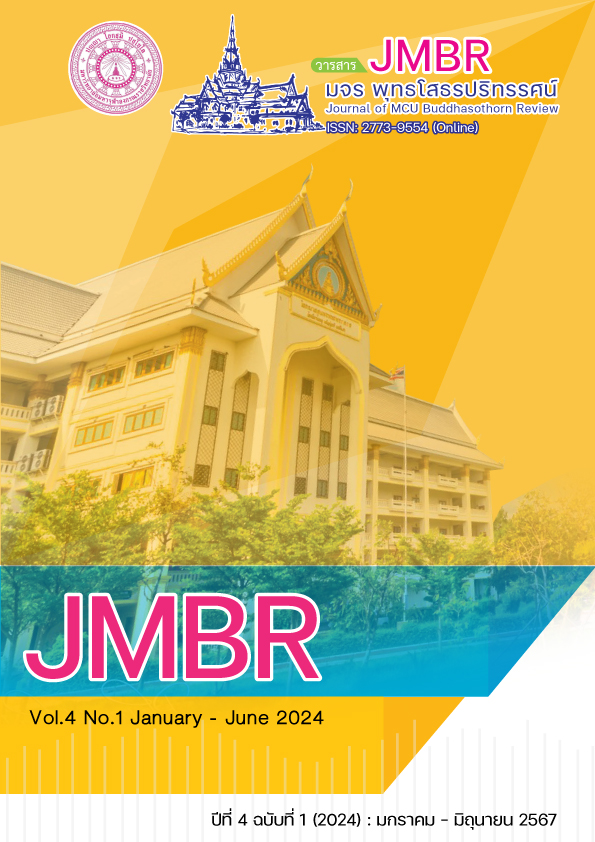Transitioning from Teaching to Instructional Coaching: A New Dimension of Learning in Digital Disruption
Main Article Content
Abstract
Coaching is a tool that educators use to guide learners in the right direction. Coaches provide the guidance and use the powerful questioning to enable learners and utilize their own potential in learning through hands-on experience. Moreover, they construct knowledge themselves and can continuously develop. Therefore, the instructional coaching plays the significant role in developing learners to achieve success in learning goals and to effectively apply the learned learning skills on the learning and work in the future.
This article aims to present concepts related to the teaching and Instructional coaching, or similarities and differences between the Instructional coaching and the ordinary teaching, the benefits of the instructional coaching in the classroom, including the importance of transitioning from the ordinary teaching into the instructional coaching, besides, strategies for integrating the instructional coaching into the classroom and the challenging changes in implementing instructional coaching in the classroom were the significant factor in this point.
This studying through the documents, the textbooks, the academic articles, and the various researches revealed that the instructional coaching serves and supports the educational important technique as a supportive tool by inspiring learners to self-directed learning, fostering learners' cognitive processes for growth, developing high-level thinking skills, fostering self-confidence, self-guided learning discipline, and continuous self-improvement. Therefore, all of those which are the crucial characteristics in the Digital Disruption. Additionally, both of the instructors and learners have the opportunity to exchange and learn together through the instructional coaching process.
Article Details

This work is licensed under a Creative Commons Attribution-NonCommercial-NoDerivatives 4.0 International License.
ต้นฉบับที่ได้รับการตีพิมพ์ในวารสาร มจร พุทธโสธรปริทรรศน์ วิทยาลัยสงฆ์พุทธโสธร มหาวิทยาลัยมหาจุฬาลงกรณราชวิทยาลัย ถือเป็นกรรมสิทธิ์ของวิทยาลัยสงฆ์พุทธโสธร มหาวิทยาลัยมหาจุฬาลงกรณราชวิทยาลัย ห้ามนำข้อความทั้งหมดหรือบางส่วนไปพิมพ์ซ้ำ เว้นเสีย แต่ว่าจะได้รับอนุญาตจากวิทยาลัยฯ เป็นลายลักษณ์อักษร และเพื่อให้เป็นไปตามกฎหมายลิขสิทธิ์ ผู้เขียนทุกท่านต้องลงลายมือชื่อในแบบฟอร์มใบมอบลิขสิทธิ์ บทความให้แก่วารสาร พร้อมกับบทความต้นฉบับที่ได้แก้ไขครั้งสุดท้าย นอกจากนี้ ผู้เขียนทุกท่านต้องยืนยันว่าบทความต้นฉบับที่ส่งมาตีพิมพ์นั้น ได้ส่งมาตีพิมพ์เฉพาะในวารสาร มจร พุทธโสธรปริทรรศน์ เพียงแห่งเดียวเท่านั้น
References
กมลวรรณ คารม ปราชญ์ คล้ายแก้ว และพิชชาดา ประสิทธิโชค. (2564). การโค้ชเพื่อสร้างแรงบันดาลใจให้ผู้เรียนในการดำเนินโครงการจิตอาสาทำความดีเพื่อสังคม. วารสารวิชาการศึกษาศาสตร์, 22 (1), 150-162.
เจือจันทร์ จงสถิตอยู่. (2558). รายงานการสังเคราะห์ผลการดำเนินการชุดโครงการวิจัยกระบวนการพัฒนา ครูด้วยระบบหนุนนำต่อเนื่อง (Teacher Coaching). กรุงเทพฯ: สำนักงานกองทุนสนับสนุนการวิจัย (สกว.).
ชญาภา กาญจนทวีวัฒน์. (2565). รูปแบบการพัฒนาโค้ชผู้นำต้นแบบสันติภาพโดยพุทธสันติวิธี. สืบค้นเมื่อ 3 พฤษภาคม 2567, จาก https://e-thesis.mcu.ac.th/thesis/4355.
ดวงใจทิพย์ ณ สงขลา. (2561). การออกแบบการเรียนแนวดิจิทัล = Digital learning design. กรุงเทพฯ : จุฬาลงกรณ์มหาวิทยาลัย.
ณัฏฐนิธ กาลพัฒน์ สุวิทย์ภาณุจารี และวีระวัฒน์ พัฒนกุลชัย. (2565). การพัฒนาการบริหารทรัพยากรมนุษย์ด้วยทักษะการโค้ช. วารสารนวัตกรรมการศึกษาและการวิจัย, 6 (2), 580-595.
ทิศนา แขมมณี. (2557). ปลุกโลกการสอนให้มีชีวิตสู่ห้องเรียนแห่งศตวรรษใหม่. สำนักงานส่งเสริมสังคม
แห่งการเรียนรู้และคุณภาพเยาวชน : สหมิตรพริ้นติ้งแอนด์พับลิสชิ่ง.
ธนวัฒน์ ศรีไพโรจน์. (2561). อิทธิพลของโปรแกรมการโค้ชการจัดการเรียนรู้โดยใช้โครงงานเป็นฐานที่มีต่อสมรรถนะของครูผู้สอนเพื่อทักษะการเรียนรู้และนวัตกรรมของผู้เรียน (วิทยานิพนธ์วิจัยพฤติกรรมศาสตร์ประยุกต์ดุษฎีบัณฑิต). มหาวิทยาลัยศรีนครินทรวิโรฒ.
เบญจมาภรณ์ ฤาไชย และลลิตพรรณ ปัญญานาค. (2564). การศึกษากลวิธีการโค้ชเพื่อพัฒนารูปแบบการเรียนการสอนภาษาจีน. วารสารสหวิทยาการวิจัยและวิชาการ, 4 (2), 47-56.
พระภัทรชัยญกรณ์ อูดสวย. (2023). รูปแบบการพัฒนาคุณภาพบุคลากรครูในโรงเรียนตำรวจตระเวนชายแดนตามหลักกัลยาณมิตรธรรม 7. วารสาร มจร พุทธโสธรปริทรรศน์, 3 (1), 29-40.
เพลินตา พรหมบัวศรี และอรพิน สวางวัฒนเศรษฐ์. (2017). การพัฒนาครูโค้ชในศตวรรษที่ 21. Journal of Health Science research, 11 (1), 110-120.
วิจารณ์ พานิช. (2562). เอื้อระบบนิเวศเพื่อครูเป็นผู้ก่อการ. กรุงเทพฯ: มูลนิธิสยามกัมมาจล.
วิชัย วงษ์ใหญ่ และมารุต พัฒผล. (2558). การโค้ชเพื่อการรู้คิด. พิมพ์ครั้งที่ 5. กรุงเทพฯ: จรัลสนิทวงศ์การพิมพ์.
วิมลรัตน์ สุนทรโรจน์. (2559). การพัฒนาความสามารถด้านการทำวิจัยในชั้นเรียนของนิสิตสาขาวิชาภาษาไทยชั้นปีที่ 3 โดยใช้กระบวนการ Coaching และ Mentoring. วารสารศึกษาศาสตร์มหาวิทยาลัยมหาสารคาม, 10 (4), 166-176.
วิสุทธิศักดิ์ หวานพร้อม. (2564). การพัฒนาการโค้ชเพื่อเสริมสร้างสมรรถนะครูในการจัดการเรียนรู้ผ่านประสบการณ์เพื่อพัฒนาการคิดวิเคราะห์สำหรับนักเรียน. วารสารสังคมศาสตร์และมานุษยวิทยาเชิงพุทธ. 6 (12), 669-684.
ศศิมา สุขสว่าง. (2567). การพัฒนานวัตกรรมโดยใช้ Design Thinking. สืบค้นเมื่อ 20 พฤษภาคม 2567, จาก https://hcd-innovation.teachable.com/courses/author/290247.
ศักดิ์ดา งานหมั่น พระสิทธิชัย รินฤทธิ์ และพระพนมภรณ์ กับบุญ .(2564). การพัฒนาทักษะครูในศตวรรษที่ 21กับการบูรณาการนวัตกรรม. วารสาร มจร พุทธโสธรปริทรรศน์, 1 (2), 79-93.
ศุภลักษณ์ ทองจีน. (2560). เอกสารประกอบการสอน รายวิชา การออกแบบและการจัดการเรียนรู้. อุดรธานี: มหาวิทยาลัยราชภัฏอุดรธานี.
สมาพร มณีอ่อน. (2560). การพัฒนาครูในศตวรรษที่ 21 โดยใช้เทคนิคการโค้ช (Coaching). วารสารศึกษาศาสตร์มหาวิทยาลัยศิลปากร, 15 (2), 61-73.
สำนักงานเขตพื้นที่การศึกษามัธยมศึกษา เขต 29 .(2563). สื่อการนิเทศ เรื่อง การดำเนินงานตามการติดตามประเมินผลตามตัวชี้วัดแผนปฏิบัติราชการของสำนักงานคณะกรรมการการศึกษาขั้นพื้นฐาน ประจำปีงบประมาณ พ.ศ. 2563. กลุ่มนิเทศ ติดตามและประเมินผลการจัดการศึกษา สำนักงานเขตพื้นที่การศึกษามัธยมศึกษา เขต 29.
สำนักงานคณะกรรมการพัฒนาการเศรษฐกิจและสังคมแห่งชาติ. (2561). ยุทธศาสตร์ชาติระยะ 20 ปี (พ.ศ. 2561-2580). พิมพ์ครั้งที่ 1. กรุงเทพฯ : สำนักงานเลขานุการของคณะกรรมการ ยุทธศาสตร์ชาติ สำนักงานคณะกรรมการพัฒนาการเศรษฐกิจและสังคมแห่งชาติ.
อมฤดา พงษ์ศักดิ์ และชนสิทธิ์ สิทธิ์สูงเนิน. (2020). การโค้ชแบบเพื่อนช่วยเพื่อน เพื่อส่งเสริมความสามารถในการจัดการเรียนรู้ของครูภาษาไทยตามแนวคิด Active Learning ในการพัฒนาทักษะการอ่านจับใจความของนักเรียนชั้นประถมศึกษา. วารสารศิลปากรศึกษาศาสตร์วิจัย, 12 (2), 272-288.
อาภรณ์ ใจเที่ยง. (2553). หลักการสอน. พิมพ์ครั้งที่ 5. กรุงเทพฯ: โอ. เอส. พริ้นติ้ง เฮ้าส์.
Brookfield, S. D. (2015). The Skillful Teacher: On Technique, Trust, and Responsiveness in the Classroom. Wiley : Jossey-Bass.
Cox, E., Bachkirova,T. and Clutterbuck, D. (2014). Theoretical Traditions and Coaching Genres: Mapping the Territory. Developing Human Resources, 16(2), 139-160.
Elizabeth, G.K. (2019). The transition from classroom teacher to instructional Coach : A Transcendental phenomenological study. A Dissertation Presented in Partial Fulfillment Of the Requirements for the Degree Doctor of Education, Liberty University.
Gibbons, L. K., Kazemi, E., & Lewis, R. M. (2017). Developing collective capacity to improve mathematics instruction: Coaching as a lever for school-wide improvement. The Journal of Mathematical Behavior. 46(1), 231–250.
Girish, M. and Datta, C. (2023). Power of Coaching. สืบค้นเมื่อ 5 มิถุนายน 2567 จาก https://globalcoachinglab.com/5-common-challenges-in-coaching-. engagement/.
Grant, A. M. (2017). "The Efficacy of Coaching." In The Wiley Blackwell Handbook of
thePsychology of Coaching and Mentoring. International Coaching Psychology Review, 2(1), 24–32.
Kho, S., Saeed, K. M., & Mohamed, A. R. (2019). Instructional Coaching as a Tool forProfessionalDevelopment: Coaches’ Roles and Considerations. The Qualitative Report, 24 (5),1106-1132.
Knight, J. (2007). Instructional Coaching: A Partnership Approach to Improving Instruction.Corwin Press & NSDC.
Matsumura, C., Garnier, H. & Spybrook, J. (2014). Literacy coaching to improve student readingachievement: A multi-level mediation model. Learning and Instruction, 25 (1), 35-48.
National Council of Teachers of Mathematics. (2014). Principles to Actions: Ensuring Mathematical Success for All. NCTM.
Tekir, S. (2022). Coaching for better teaching: a study on student-centered instructional coaching. Journal of Qualitative Research in Education, 31, 159-182.
Tope, Misti N, (2023). A Multiple Case Study: The Impact of Instructional Coaching on Novice Teachers. Digital Commons @ ACU, Electronic Theses and Dissertations.
Saimoon, S. (2015). Coaching and mentoring in Thai educational reform. European Journal of Education Studies, 1(1), 28-34.
Samaddar, R., Mukherjee, S., Sikdar, D.P. (2023). Documentary analysis on challenges Of classroom management. International Journal of Creative Research Thought.11 (3), c613-c622.
Smith, M., and Firth, Jonathan. (2018). Psychology in the Classroom: A Teacher’s Guide to What Works. Oxon: Routledge.
Smith, P. S., Hayes, M. L., & Lyons, K. M. (2016). The ecology of instructional teacher leadership.The Journal of Mathematical Behavior, 46(1), 267-288.
Suresh., K. (2014). A Study on Study Habits, Achievement Motivation and Academic Achievement of High School Students. EPRA International Journal of Economic and BusinessReview, 3 (10), 138-141.
Sweeney, D. and Harris, L.S. (2020). The Essential Guide for Student-Centered Coaching: What Every K-12 Coach and School Leader Needs to Know. UK: SAGE Corwin.


